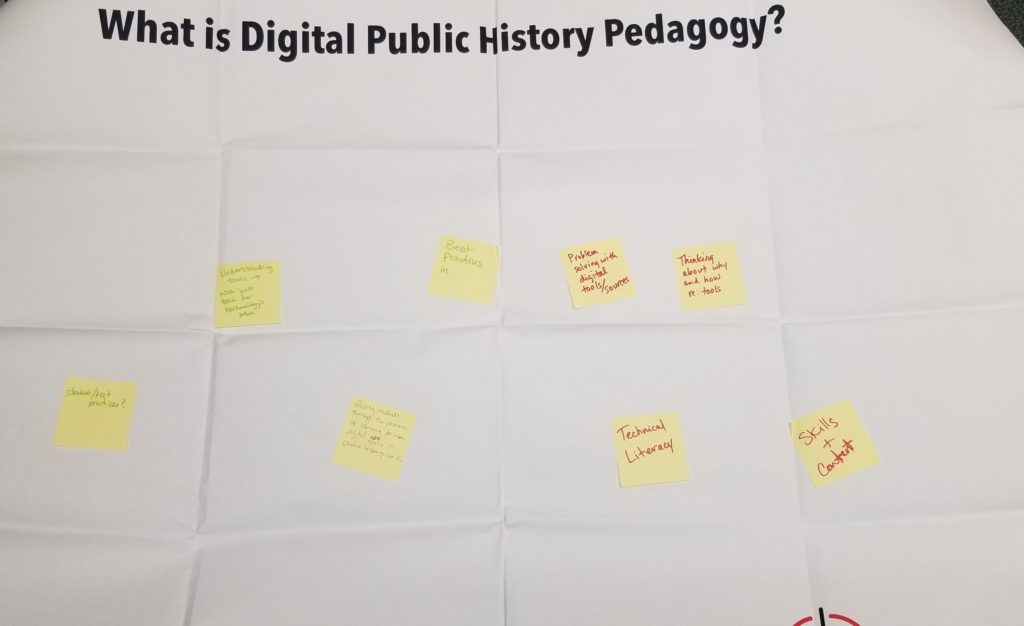The National Council on Public History conference took place in Hartford, Connecticut March 27-30th. The conference brings together public historians from all over to discuss, workshop, share, collaborate, and much more on challenges and opportunities within the public history field.
Digital Public History Lab
I feel very lucky to have facilitated a session and participated in the Digital Public History Lab organized by historians Abby Curtain Teare and Julie Davis. It was much more than a workshop. It was truly a lab with experiments that churned out many hypotheses and messy concoctions. All of this produced an abundance of inquiries and calls to action in what one can only consider a perfect symphony of actors working together.
I have been to a number of conferences over the past year and this was by far one of the most rewarding experiences that forced me to think more comprehensively about when it comes to working with students and faculty on The College of Wooster campus with digital tools/methods and pedagogy.
Digital Public History Pedagogy
When I was asked to write a blurb about what my session would be for the NCPH program, I can recall many things going through my head. Questions such as: What do we mean by ‘pedagogy’? How do we label all of this? How do you find support for these types of projects on campus? What models should be used in the undergraduate classroom? Which models already exist? I felt like I was regurgitating much of my master’s thesis. It became clear that this was going to be as much of a cathartic learning experience for me as it would be for those that participated in the workshop.
I sometimes refer to myself as recovering public historian since I “left” the field of public history. I use “left” lucratively in quotes because my position still entwines me with the field but in a very different if not more robust way. My session and the Digital Public History Lab validated these ideas about my complicated relationship to the field of public history.
My workshop moved between discussing what do we mean by digital history pedagogy to what do we do with all of this ‘stuff.’ Trying to figure out how to make all of these pieces work together is always a challenge for an educator but it is even further complicated when you struggle to where to even begin.
One of the exercises I had participants do in my session was to write out their ideas about what digital public history pedagogy means to them. By far, this was the hardest thing for the participants to do because digital public history pedagogy means many things for public history educators. I wish I would have set this out through the whole Digital Public History Lab as I am confident the results would have been quite telling about pedagogy, tools, and skills.

While the session explored pedagogy through various tools such as VisualEyes and VR, I think the participants would agree that we could have spent hours just sitting around talking about pedagogy without even looking at a tool. In many ways, that itself may have been more productive. Bottom line: good teaching, good scholarship, and good open conversations with students are critical before we even throw a tool into the mix. If we want students to be prepared outside of the classroom, then more work is needed on our part as educators.
Practice Google VR Tour from Workshop
Take Aways
What was fantastic about the Digital Public History Lab is that it brought historians from various backgrounds, abilities, and knowledge together into one space. By doing so, it created an open and safe space for experimentation and questions. For that reason alone, it would be great to see a model like this expanded into faculty professional development that would bring together many collaborators in one space to facilitate discussions on pedagogy and digital tools. It is critical that we continue to have these messy conversations to promote collaboration, learning, and discovery amongst ourselves.
The Google Drive Folder from my session, it is freely accessible and open for use at: NCPH Digital Public History Pedagogy Workshop. If you have any questions, feel free to reach out to me at msmeznik@wooster.edu.
